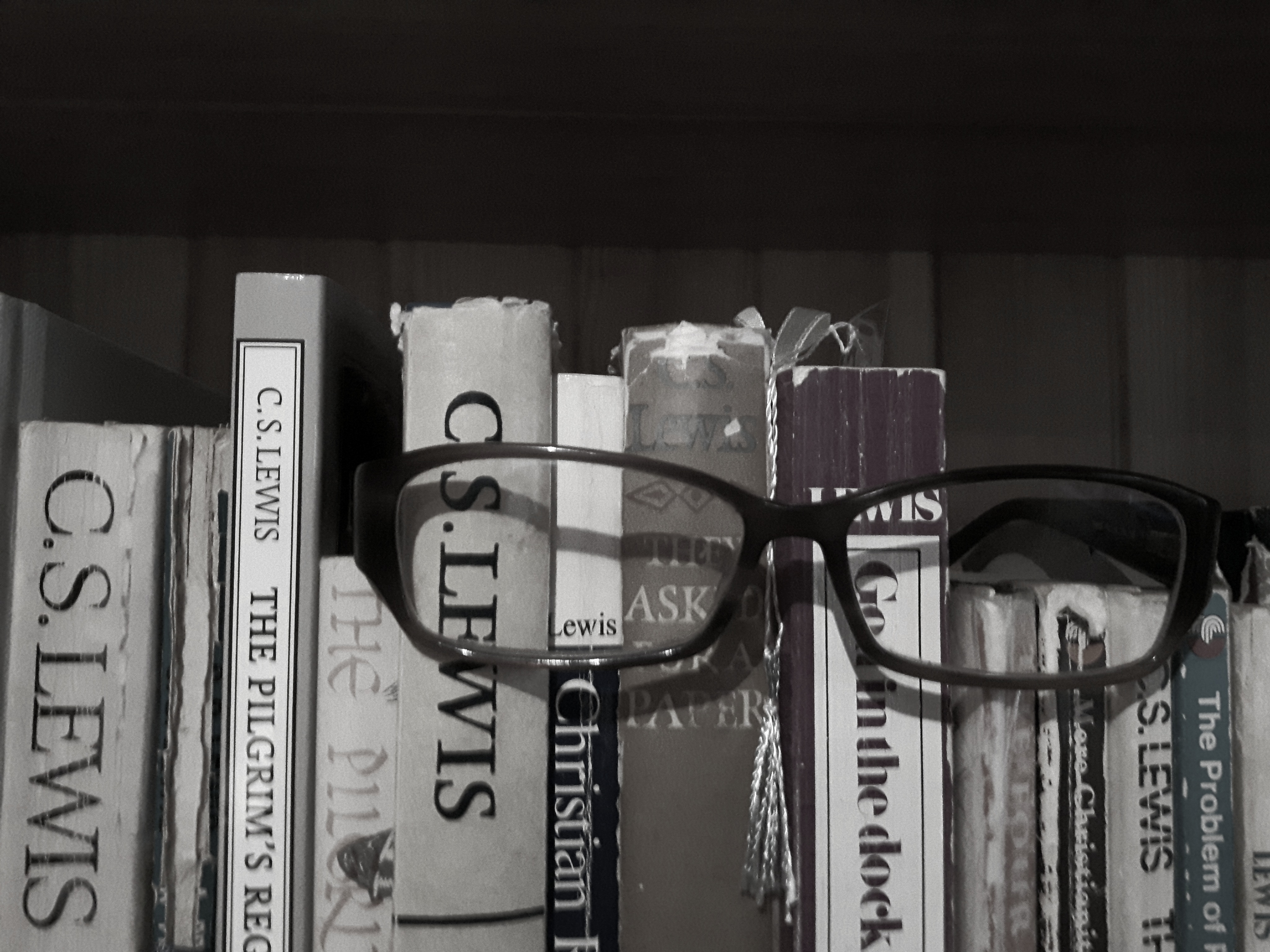
If it hasn’t happened to you yet, it will most likely happen: this weird thing people call “bifocal vision.” When your vision starts going wonky so that your arm isn’t long enough to decipher what’s right in front of you, you need help: you need bifocal glasses.
When it happened to me, it seemed to have happened all at once. From one day to the next I’d apparently gone from fine vision to being unable to read without holding the book farther and farther away (that extensible arm movement which is humorous to behold in others but doesn’t help the blinking, squinting, squirming would-be reader–you.) Yet, with the right glasses, yes indeed, you get to see the short and long view of things again: two realms, near and far.
 Bifocal vision marks the end of a youthful era. What has this possibly to do with hope? I suppose leaving one’s youth behind can be a kind of good? (Let’s try to count the ways in which loss also leads to gain.)
Bifocal vision marks the end of a youthful era. What has this possibly to do with hope? I suppose leaving one’s youth behind can be a kind of good? (Let’s try to count the ways in which loss also leads to gain.)
Stephen Prickett, the renowned literary scholar, died last week. Full stop.
If you haven’t yet encountered Stephen’s work, this tribute by Jeffrey W. Barbeau is a good place to start.
When a dear friend gave me the news, something in me came to a full stop. Then a kaleidoscope of memories arose. (Isn’t it remarkable how in time all the details of life resound with fuller meaning?) Stephen’s kind email to me this past July. The last thing I probably heard him say to a few of us two years ago. On a frosty November evening walk in Romania, Stephen announced in his perky, cheery way: “The weather is changing. It’s thawing.” Ah, such a simple thing to point out. And in the big picture, so pregnant with meaning.
Frost and thawing. In me, in us, we experience both frost and thawing as we are deeply saddened over Stephen’s passing, and at once also deeply grateful, joyful, for his life and how he impacted us. Frost and thawing, sadness and joyous gratitude overlay one another. I suppose that’s a kind of bifocal experience: feeling two things at once.
 Stephen was the first person who invited me to give a keynote address. It was for Oxford, at C. S. Lewis’s Magdalen College, no less. What?! Me?! Oh, what a marvelous time it was, that Oxford conference by the George MacDonald Society in 2014. (You can read a lot of what we thought and said in the book, Informing the Inklings: George MacDonald and the Victorian Roots of Modern Fantasy.)
Stephen was the first person who invited me to give a keynote address. It was for Oxford, at C. S. Lewis’s Magdalen College, no less. What?! Me?! Oh, what a marvelous time it was, that Oxford conference by the George MacDonald Society in 2014. (You can read a lot of what we thought and said in the book, Informing the Inklings: George MacDonald and the Victorian Roots of Modern Fantasy.)
I remember how glad Stephen was when I quoted A.D. Nuttall in my paper (“Nuttall hailed Lewis as ‘Jack the Giant-Killer’ for having fought and slain one giant of the intelligentsia: the giant of subjectivism.”) Stephen said he’d known Nuttall and he was glad—so very glad, as his warm voice attested, that Nuttall’s work is remembered. And me? Of course, Nuttall’s voice is remembered! How could it not be? But also, it was like my voice had joined the choir. Singing in a choir—there’s nothing like it, really, is there? Your voice gets to join something great and growing greater. Shockingly amazing. How does this happen? My small voice, the multitudinous voices: bifocal vision.
In 2018 I got to sit beside Stephen as we gave keynote addresses for the C.S. Lewis and Kindred Spirits Conference at Alexandru Ioan Cuza University of Iași, Romania. In the brief moments after my address, Stephen swiftly pointed out to me that he disagreed on my point about Christians and the culture wars. We didn’t pick up on this important subject on that busy day, but his candid, friendly remark has sat with me ever since. What had he thought I’d said? What did he disagree with and why? I’d cited folks who’ve spoken to increasing persecution of Christians in the culture wars. Clearly, one can see current culture wars being fought with the perception of Christianity as public enemy number . . . pick a number. My first reaction to Stephen’s brief comment was to disagree, naturally, but the more I thought about it, I began to see what I think he might have meant: culture wars do not result in Christianity? Christianity cannot be fought through culture wars? Political savvy, however important (or not), is not the way to Christ? It helps no one to view Christians as being against the general culture, because in the truest sense it isn’t? On a smaller scale, Christians serve in and vote for any number of political parties for various reasons, obviously.
Stephen properly checked me that day. If only because one thing I’d said could have triggered what I hadn’t intended, or had intended but would need to unpack further in future. I’m so grateful for Stephen’s commitment to courteous dialogue. I keep wrestling with his comment because it helps me to keep foremost what Jesus was so firm about: His kingdom is not of this world. Bifocal vision again: the culture wars where Christians are sometimes targeted; and the kingdom reality that cannot be reduced to culture wars.
 I have another reason for associating Stephen with bifocal vision. Every time I teach George MacDonald, which is a fair bit, I refer my students to Stephen’s comment on this Victorian author. MacDonald, Stephen said, had “bifocal” vision, meaning that he saw two worlds at once, the temporal and the eternal (“The Two Worlds of George MacDonald”).
I have another reason for associating Stephen with bifocal vision. Every time I teach George MacDonald, which is a fair bit, I refer my students to Stephen’s comment on this Victorian author. MacDonald, Stephen said, had “bifocal” vision, meaning that he saw two worlds at once, the temporal and the eternal (“The Two Worlds of George MacDonald”).
Brilliant: the metaphor of bifocal vision, the short and long view of things, the now and the beyond—and both at once, neither displacing the other. Yes, MacDonald sees this world so very clearly, in all its beauty, ugliness, and suffering. And the whole time that he’s showing us ourselves and our world he’s also showing us all these things in the light of eternity—how everything might look from God’s perspective: our beauty, ugliness, and suffering taken up by God’s majestic grace and so transformed by forgiveness into redemption. MacDonald never sacrifices one kind of vision for the other.
This kind of bifocal vision is surely the vision of hope. MacDonald even emphasizes that such vision doesn’t come with age in and of itself. Quite the opposite. Proper bifocal vision is tied to childlike wonder. You have to have that open-hearted wonder which we associate with young children in order to properly see. MacDonald qualifies this further by saying that not all children have childlike wonder—it’s truly an attitude of the heart. It grows in the soil of humility, slowly, as we wage war with pride, I think.
Temporal alongside eternal vision gives me hope. Like MacDonald, I can wish to see both worlds at once, which leads to cherishing this world all the more but saves me from despair in the light of the coming one—the coming world which is already, always, mysteriously operating in our present. We are here, now, in earthly fellowship such as it is; and we also belong to the communion of saints that is everlasting. Deep breath!
In her chapter in the forthcoming book, The Inklings and Culture: A Harvest of Scholarship from the Inklings Institute of Canada, scholar Kirstin Jeffrey Johnson writes of authors like MacDonald, Lewis, Tolkien, and countless others who “intentionally place themselves in . . . a tradition of storied conversation.” They don’t write out of an individualistic vacuum. They join a conversation. Looking ahead to life everlasting, Jeffrey Johnson adds, MacDonald “even dares his reader to read (and to ‘sub-create’) in the eschatological awareness that this ‘cloud of witnesses’ may yet someday be engaged face-to-face.” Oh! Heart-stopping and heart-quickening reality. One day face-to-face with all the company which has gone before us. Reading them now; speaking with them then. The communion of saints in life everlasting, each of us taken up into this fellowship, starting in this here-ness where we live and move and have our being. Bifocal vision: here and there, now and then, both: ultimate hope.
 So when I walk darkening wintry streets, I want to remember that the weather will change. Stephen’s comment to us that one night also helps me to remember. Frost for a time but not forever. The Great Thaw is coming. The White Witch’s reign is temporary; Aslan will return. And as I walk along I need to see what’s right in front of me as clearly as possible; but I also need to have the long view of life everlasting. The short and the long view—bifocal vision—enables hope.
So when I walk darkening wintry streets, I want to remember that the weather will change. Stephen’s comment to us that one night also helps me to remember. Frost for a time but not forever. The Great Thaw is coming. The White Witch’s reign is temporary; Aslan will return. And as I walk along I need to see what’s right in front of me as clearly as possible; but I also need to have the long view of life everlasting. The short and the long view—bifocal vision—enables hope.
Maybe it’s only when we can’t decipher what’s right in front of us that we’re more open to bifocal vision correction? And so the short view, clearer, may also enhance the long view?
We salute you, Stephen. We will miss you very much.
Thank you.

Thank you for sharing this Moni!
LikeLike
Thank you so much, Annette!!
LikeLike